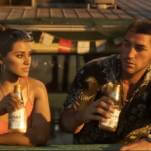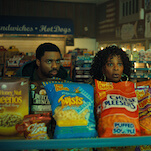So … One of the biggest knocks against film critics by regular moviegoers is that we look for art where it doesn't exist; and, more importantly, where it doesn't need to exist. I can't count how many letters to the editor I've read–some even directed at me–that feature some variation on, "Not every movie has to be Oscar-worthy." To which I want to say, "Yeah, no shit." Personally, I don't know any critics who are looking for Oscar-worthy every time they step into a theater. (And I know quite a few critics who want nothing to do with the kinds of movies the Oscars recognize.) I think most of us can deal with what the movie in front of us is trying to do; and we try to say whether the dopey action flick we're watching is a good dopey action flick or a bad one. (Though certainly some members of my crew have no use for dopey action flicks at all, good or bad. And in guessing what a movie is trying to be, we run the risk of being like that critic in Lady In The Water, who gets mauled by a beastie for "presuming.")
Would it have been a dealbreaker if these movies didn't offer more than just sensation? Not at all. Like I wrote earlier this summer about Pirates Of The Carribean 2, sometimes you can just enjoy the effort to entertain, and the classical construction of a crowd-pleaser. The older I get, the more I appreciate a set piece like POTC2's big water-wheel swordfight, which took a lot of imagination and old-fashioned design sense (and, unfortunately, was partly botchd by Gore Verbinski's overactive mise-en-scene).
Heck, somedays even Blondie gets a chuckle out of me, just because its set-ups and gags are so wonderfully antique. I'm not saying I value a well-built Blondie over any given day of Achewood. (Incidentally, this is the funniest Achewood maybe ever … though this one comes close.) Similarly, there's no way that Pirates is going to make my list of best movies of '06. But while I don't want to fall into the "good for what it is" trap that Nathan wrote about, I'll gladly say that I enjoyed Pirates, and not just in an "I'm easily distracted by shiny things" kind of way.
Though I certainly know critics who would like Pirates for its shininess. Or, to put it more accurately, who'd be watching the movie as though it were a rapid series of still photographs, to be appreciated for the quality of the framing and the depth of the image. (Just the way it was in the early days of cinema, when people considered it an offshoot of photography, and "quality" was primarily a technical term.)
I also know critics who were looking forward to Snakes On A Plane because it's the latest movie from the director of the solidly put-together thriller Cellular. And critics who don't care much about bad acting or bad dialogue because they're watching the camera moves and use of color. And critics who only examine movies for their Marxist subtext, or what they say about gender issues.
Just as movies can be trying to do a lot of different things, so the people looking at them can have a whole different set of agendas. And the biggest problem with critics is that we're not always willing to expand the ways we watch. I see that all the time with documentaries especially. A lot of my critic friends are interested in cinema for its essential elements of editing and photography, and aren't impressed with documentaries that are aesthetically plain but which contain strong journalism–even if those critics might be inclined to enjoy a similarly well-researched magazine article. And very few critics I know are willing to give "chick flicks" or "uplifting sports dramas" the kind of breaks for their clichés that they would give, say, a kung fu flick.
If it's understood that a certain suspension of disbelief is required for action movies, then why can't we shrug off the predictable rhythms of a feel-good story–as reliable in their way as a Sunday sermon? (This is why, in the end, I didn't mind the simplicity of World Trade Center, whatever the movie's greater failings as drama.) Like anybody else, I appreciate when a genre piece breaks free of its formulas, and shows me something new. But I like the formulas too, which have been around so long that they have a kind of venerability. Sometimes I think we in the culture at large are too quick to reward novelty as an end in itself. And in the critical culture especially, we're drawn to dissonance, just because it strikes a different chord than we're used to. (I'm guilty of it too; when I'm watching an action movie, I usually prefer a long, idle conversation among the heroes to whatever big gunfight and/or chase scene lies in wait for me at the climax.)
The problem is that critics and non-pro movie buffs alike have a hard time not thinking of movies as being objectively "good" or "bad." But how do you determine that objective standard? If a movie features flat acting, it's bad, right? Unless it's a movie by Stanley Kubrick or David Lynch, who use flat acting intentionally, and then it's good, right? Unless it's a movie by some Kubrick//Lynch wannabe, who turns flat acting into an art-film cliché, and then it's bad again. Right?
We–and I mean that "we" inclusively, critic and fan–don't help matters either with our grades and rankings, which sometimes encourage us to overrate movies that we admire but don't love, and to underrate the kinds of movies that people rent at the video store on a Friday night, or watch over and over again on TBS. I'm not saying that it's wrong to try to elevate the good and shine a harsh light on the bad, but there should be a little more wriggle room for movies that are bad in some ways but good in others–even if that "good" is just the way they can dominate popular culture for a few weeks, a la Pirates Of The Caribbean. If you decide that the fun of sharing in the zeitgeist isn't worth it because a movie's just too shitty, that's cool; but it's important to recognize that some movies really do have their primary value as phenomena.
If the summer movie season teaches us anything, year after year, it's that if movies can be novels, and essays, and art installations, and reportage, and scrapbooks, and pulp trash, then they can also be a kind of cultural comfort food, as familiar (and as annoying to some people) as a trip home to see the folks. It's a quality of movies that's hard to qualify–and may be critically useless, because it doesn't allow for a lot of debate–but it's there, it's significant, and there should be a way to acknowledge it without automatically elevating every piece of pop crap to the level of good pop, let alone to the level of a masterpiece. Maybe the key is to funnel the objective through the subjective: to own up to what sucks about a movie and then explain why, ultimately, it might not matter.
That'll have to happen later, because for now it's farewell summer '06. In a couple of weeks I'll be off to Toronto, where I'll leave commerce aside and get my art on. That's a more respectable place to hang out, and it nourishes my soul and intellect more. But, I confess, it's not where I live.







































